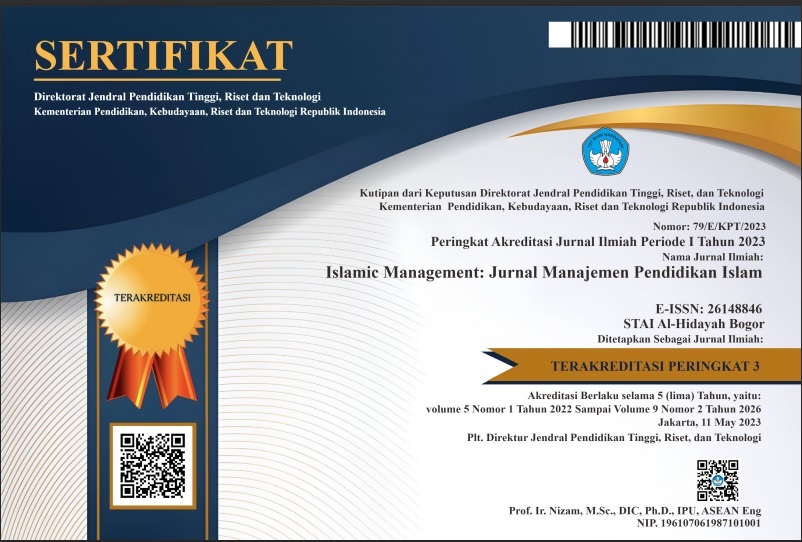PROJECT-BASED LEARNING STRATEGY IN ISLAMIC RELIGIOUS EDUCATION TO ENHANCE STUDENTS' CRITICAL THINKING SKILLS
DOI:
https://doi.org/10.30868/im.v8i02.8447Keywords:
Project-Based Learning, Islamic Religious Education, Critical Thinking, Islamic Values, Mixed-Method ApproachAbstract
Islamic Religious Education (PAI) has an important role in shaping the character, morals, and ethics of students. However, the challenge faced in PAI learning today is the lack of an approach that encourages students to think critically, analytically, and reflectively towards religious values and the social realities around them. This study examines the effectiveness of implementing Project-Based Learning (PBL) integrated with Islamic values in improving students' critical thinking skills in Islamic religious education. The research method used is a mixed-method approach with a quantitative experimental design, complemented by qualitative analysis through in-depth interviews, focus group discussions, and classroom observations. Data was collected through critical thinking ability tests, project documentation, and teacher and student perceptions regarding the relevance of Islamic values in the learning process. The results showed that implementing the PBL model significantly increased the critical thinking ability score in the experimental group compared to the control group. In addition to improving cognitive performance, qualitative findings revealed increased motivation, engagement, and the formation of ethical and spiritual character among students. The study's conclusion confirms that the integration of Islamic values in PBL enriches the cognitive dimension of learning and contributes to the development of students' character and theological insight as a whole. The implications of this research encourage the development of more adaptive and collaborative learning models, which Islamic religious educational institutions can adopt to answer the increasingly dynamic demands of 21st-century education.
References
Abdullah, Amir. 2017. "Enhancing Critical Thinking through Project‐Based Learning in Islamic Education." Journal of Islamic Pedagogy 8, no. 2: 101–121.
Al-Rashid, Omar, and Fahad Al-Ahmari. 2018. "Integrating Islamic Values in Higher Education: A PBL Approach." Journal of Islamic Higher Education 6, no. 2: 45–63.
Bell, Sean. 2016. "Global Trends in Project‐Based Learning: A Comparative Study." International Journal of Education Research 14, no. 1: 65–84.
Fauzi, R. 2019. "Project‐Based Learning in the Islamic Classroom: Transforming Teaching Practices." Indonesian Journal of Islamic Education 15, no. 2: 77–98.
Hassan, Nabil, and Mohammad Ibrahim. 2019. "Character Development and Critical Thinking: The Role of PBL in Islamic Education." Journal of Religious and Educational Studies 17, no. 1: 33–52.
Hidayat, Usman. 2018. "Measuring Critical Thinking Improvement through Project‐Based Learning in Religious Education." Journal of Modern Pedagogical Studies 11, no. 3: 88–107.
Iman, Rahma, and Syamsul Huda. 2021. "Assessing the Integration of PBL and Islamic Ethical Values in Curriculum Design." Journal of Curriculum Studies in Islamic Education 8, no. 3: 134–152.
Irawan, Hasan. 2020. "Evaluating the Impact of PBL on Critical Thinking in Islamic Education." Journal of Southeast Asian Educational Research 7, no. 4: 112–130.
Kasim, Rafiq, and Hidayat Ali. 2020. "Impacts of Project‐Based Learning on Critical Thinking in Islamic Secondary Schools." Journal of Islamic Educational Research 9, no. 1: 76–94.
Nugroho, Budi. 2021. "Developing Innovative Learning Models: PBL and Islamic Values." Journal of Educational Development 10, no. 1: 55–75.
Rahman, Siti, and Abdul Karim. 2018. "Integrating Islamic Values into Project‐Based Learning: Challenges and Opportunities." International Journal of Educational Innovations 12, no. 3: 34–56.
Sari, Dewi, Budi Santoso, and Rina Pramesti. 2015. "The Role of Collaborative Projects in Enhancing Critical Thinking Skills among Islamic School Students." Journal of Education and Learning 9, no. 1: 45–67.
Simons, Robert, and Ahmed Musa. 2019. "Technology‐Enhanced PBL in Islamic Education: Outcomes and Challenges." International Journal of Digital Learning in Teacher Education 36, no. 4: 245–262.
Supriadi, Andi. 2022. "A Mixed‐Method Study of PBL and Its Impact on Islamic Education." International Journal of Islamic Studies 14, no. 2: 99–118.
Zhu, Li. 2020. "Project‐Based Learning and Its Effect on Critical Thinking among University Students in China." Journal of Contemporary Higher Education 13, no. 3: 150–168
Downloads
Published
How to Cite
Issue
Section
Citation Check
License
Copyright (c) 2025 Budi Sihabudin, Ahmad Sukandar

This work is licensed under a Creative Commons Attribution-ShareAlike 4.0 International License.
Authors who publish with this journal agree to the following terms:
- Authors retain copyright and grant the journal right of first publication with the work simultaneously licensed under a Creative Commons Attribution License that allows others to share the work with an acknowledgment of the work's authorship and initial publication in this journal.
- Authors are able to enter into separate, additional contractual arrangements for the non-exclusive distribution of the journal's published version of the work (e.g., post it to an institutional repository or publish it in a book), with an acknowledgment of its initial publication in this journal.
- Authors are permitted and encouraged to post their work online (e.g., in institutional repositories or on their website) prior to and during the submission process, as it can lead to productive exchanges, as well as earlier and greater citation of published work (See The Effect of Open Access).






